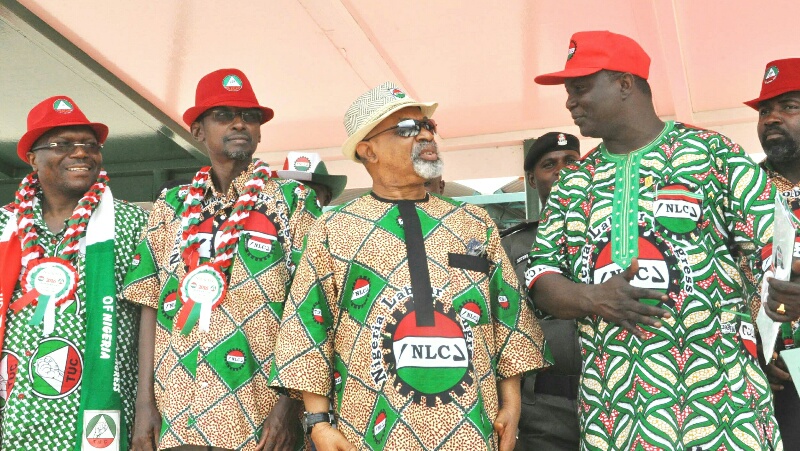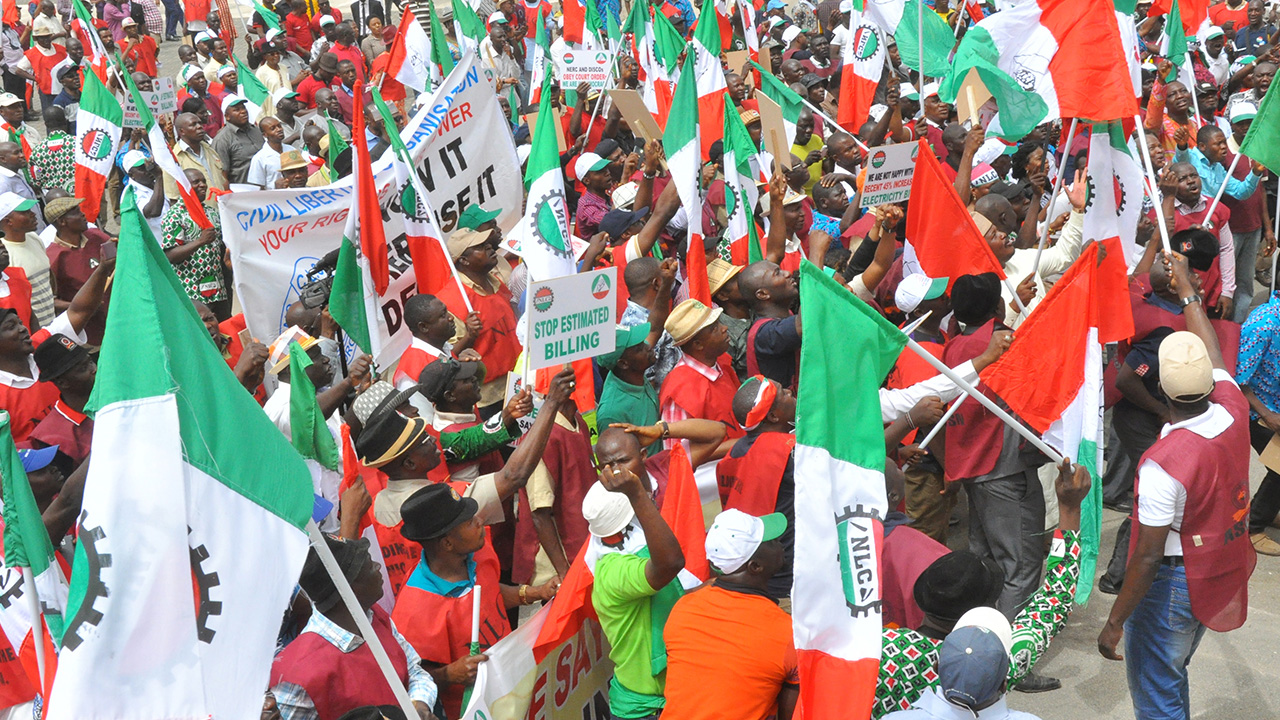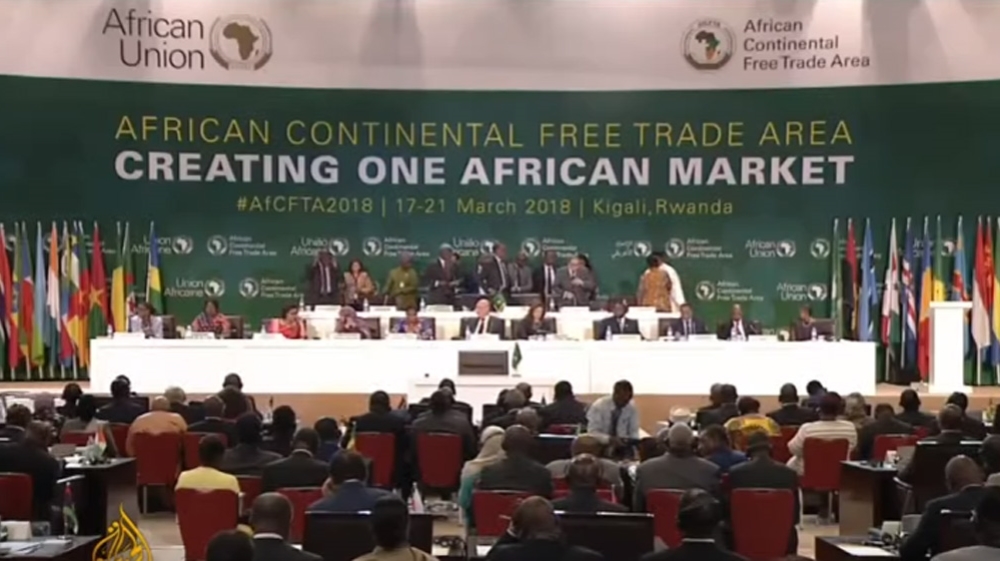Economy
Continental Free Trade Area May Cripple Nigerian Economy—Labour, Expert

By Dipo Olowookere
Federal Government has been urged to cautious of the proposed Continental Free Trade Area (CFTA) agreement it plans to sign because of the likely negative impact on private businesses and the nation’s economy.
President of the Nigerian Labour Congress (NLC), Mr Ayuba Wabba, appealed to President Muhammadu Buhari not to be cajoled into signing the proposed bill.
Mr Wabba warned that the probable outcome of the policy, if given life, may have a crippling effect on local businesses and attendant effects on jobs.
“We have no doubt this policy initiative will spell the death knell of the Nigerian economy.” the NLC President submitted.
According to some experts, the agreement, which is aimed at liberating the African economy by creating a free trade Area for all 55-member states of the African Union (AU), may end up doing more harm than good because of the sensitivity of the policy and its possible negative impact on the country’s economy and private owned industries especially.
Dr John Isemede, an international trade expert and former Director General of Nigeria Association of Chambers of Commerce Industries Mines and Agriculture (NACCIMMA), stressed that Nigeria will not really gain from the Tree Trade Area if the agreement is signed.
Mr Isemede told newsmen in Lagos that many of Nigeria’s trade agreements had even worked to its disadvantage due to poor export capacity in non-oil and low industrial capacity
“There is a need to review trade agreements and policies at this time because most of the developed countries we see today grew by closing down their borders for a while.
“Take a look at AGOA for instance, for 10 years, only very few exporters have been able to export under the platform due to poor information and lack of proper documentation.
“We have rice mills and farms that are barely functioning, except for the new intervention of the UNIDO and Bank of Industry to empower farmers and this apparently is not enough,” he said.
He advised the Federal Government to look at the critical details involved in the agreement adding that there must be a balance between import and export for a country like Nigeria to benefit from any trade agreements.
Speaking to our correspondent, Mr Emeka Nwasike Nwasike, an investment expert and CEO of Allied Trust Systems Limited said opening the borders of Nigeria will only expose local manufacturing industries in Nigeria which are struggling to survive to undue competition. He added that at a time when other countries are developing policies of protectionism for the growth and survival of its local industry, Nigeria cannot afford to jeopardize the growth of its local industries by allowing a free trade policy.
A leading Consultant and trainer in small business development, Mr Henry Agbebire, said with the high rate of importation from other regions into Africa, the region may soon become a strait for imports against local manufacturing which is a major driver of growth in any economy.
“Although the focus of the CFTA agreement is to increase Africa’s industrial and trade capacity however, nearly 85 percent of the goods traded in Africa come from outside the continent as against the 15 percent produced locally which has led to an annual food import bill of over $35 billion.
“There is therefore a very high possibility that the region would become a conduit for imports against local manufacturing if the free trade zone is allowed operation in Africa and especially in a country like Nigeria.
“No wonder developed countries and neo-liberal institutions such as UNCTAD, TRALAC, UNECA, WTO, DFID, EU USAID, World Bank etc are very enthusiastic to finance the CFTA process because they know that it would open up the African markets to their exports and at the detriment of the growth of local industries.
“According to history, all developed countries today reached their competitive position through a high import protection on agriculture and other infant industries and as a result benefited from huge subsidies and exploitation of their Southern colonial countries, particularly in Africa for centuries.
“They created the condition to do it through import protection and it is only afterwards that they opened their markets to other countries. I wonder why Africa would want to do otherwise,” he said.
Explaining further, he said, “CFTA has the tendency to reduce real income in Nigeria because, with the policy, the Federal Government will be forced to renounce to a non-negotiable source of income like tariff revenue. Also, as African countries open up, competition will be increasing on the continental market.
“This will result to trade flows such as African imports being reoriented because, partners located either on the continent or outside of the continent are being replaced by imports from African partners benefiting from better market access, thanks to tariff cuts, and potentially leading to terms of trade reduction.
“Thirdly as world prices of food products slightly increase with the liberalization reforms, net-food importing countries such as Nigeria will be hurt and their real income reduced.
Economy
NGX Market Cap Surpasses N110trn as FY 2025 Earnings Impress Investors

By Dipo Olowookere
Investors at the Nigerian Exchange (NGX) Limited have continued to show excitement for the full-year earnings of companies on the exchange so far.
On Friday, Customs Street further appreciated by 1.01 per cent as more organization released their financial statements for the 2025 fiscal year.
During the session, traders continued their selective trading strategy, with the energy sector going up by 2.47 per cent at the close of business despite profit-taking in the banking counter, which saw its index down by 0.11 per cent.
Yesterday, the insurance space grew by 2.16 per cent, the industrial goods segment expanded by 1.70 per cent, and the consumer goods industry jumped by 0.42 per cent.
Consequently, the All-Share Index (ASI) increased by 1,722.13 points to 171,727.49 points from 170,005.36 points, and the market capitalisation soared by N1.106 trillion to N110.235 trillion from the N109.129 trillion it ended on Thursday.
Business Post reports that there were 59 appreciating stocks and 19 depreciating stocks on Friday, representing a positive market breadth index and strong investor sentiment.
The trio of Omatek, Deap Capital, and NAHCO gained 10.00 per cent each to sell for N2.64, N6.82, and N136.40 apiece, as Zichis and Austin Laz appreciated by 9.98 per cent each to close at N6.72 and N5.40, respectively.
Conversely, The Initiates depreciated by 9.74 per cent to N19.45, DAAR Communications slumped by 7.32 per cent to N1.90, United Capital crashed by 6.55 per cent to N18.55, Coronation Insurance lost 5.71 per cent to quote at N3.30, and First Holdco shrank by 5.53 per cent to N47.00.
The activity chart showed an improvement in the activity level, with the trading volume, value, and number of deals up by 33.77 per cent, 93.27 per cent, and 10.63 per cent, respectively.
This was because traders transacted 953.8 million shares worth N43.1 billion in 51,005 deals compared with the 713.0 million shares valued at N22.3 billion traded in 46,104 deals a day earlier.
Fidelity Bank was the most active with 92.4 million units sold for N1.8 billion, Chams transacted 69.2 million units valued at N310.9 million, Deap Capital exchanged 59.1 million units worth N382.7 million, Access Holdings traded 57.2 million units valued at N1.3 billion, and Tantalizers transacted 48.6 million units worth N228.2 million.
Economy
Naira Retreats to N1,366.19/$1 After 13 Kobo Loss at Official Market

By Adedapo Adesanya
The value of the Naira contracted against the United States Dollar on Friday by 13 Kobo or 0.01 per cent to N1,366.19/$1 in the Nigerian Autonomous Foreign Exchange Market (NAFEX) from the previous day’s value of N1,366.06/$1.
According to data from the Central Bank of Nigeria (CBN), the Nigerian currency also depreciated against the Pound Sterling in the same market window yesterday by N2.37 to N1,857.75/£1 from the N1,855.38/£1 it was traded on Thursday, and further depleted against the Euro by 57 Kobo to close at N1,612.52/€1 versus the preceding session’s N1,611.95/€1.
In the same vein, the exchange rate for international transactions on the GTBank Naira card showed that the Naira lost N8 on the greenback yesterday to N1,383/$1 from the previous day’s N1,375/$1 and at the black market, the Nigerian currency maintained stability against the Dollar at N1,450/$1.
FX analysts anticipate this trend to persist, primarily influenced by increasing external reserves, renewed inflows of foreign portfolio investments, and a reduction in speculative demand.
In the short term, stability in the FX market is expected to continue, supported by policy interventions and improving market confidence.
Nigeria’s foreign reserves experienced an upward trajectory, increasing by $632.38 million within the week to $46.91 billion from $46.27 billion in the previous week.
The Dollar appreciation this week appears to be largely technical, serving as a correction to the substantial losses experienced from mid- to late January.
Meanwhile, the cryptocurrency market slightly appreciated, with Bitcoin (BTC) climbing near $68,000, up nearly 5 per cent since hitting $60,000 late on Thursday after investor confidence in crypto’s utility as a store of value, inflation hedge, and digital currency faltered.
The sell-off extended beyond crypto, with silver plunging 15 per cent and gold sliding more than 2 per cent. US stocks also fell.
The latest recoup saw the price of BTC up by 4.7 per cent to $67,978.96, as Ethereum (ETH) appreciated by 6.3 per cent to $2,021.10, and Ripple (XRP) surged by 9.5 per cent to $1.42.
In addition, Solana (SOL) grew by 7.3 per cent to $85.22, Cardano (ADA) added 6.1 per cent to trade at $0.2683, Dogecoin (DOGE) expanded by 5.4 per cent to $0.0958, Litecoin (LTC) rose by 5.2 per cent to $53.50, and Binance Coin (BNB) jumped by 2.3 per cent to $637.79, while the US Dollar Tether (USDT) and the US Dollar Coin (USDC) traded flat at $1.00 each.
Economy
Oil Prices Climb on Worries of Possible Iran-US Conflict

By Adedapo Adesanya
Oil prices settled higher on Friday as traders worried that this week’s talks between the US and Iran had failed to reduce the risk of a military conflict between the two countries.
Brent crude futures traded at $68.05 a barrel after going up by 50 cents or 0.74 per cent, and the US West Texas Intermediate (WTI) crude futures finished at $63.55 a barrel due to the addition of 26 cents or 0.41 per cent.
Iran and the US held negotiations in Muscat, the capital of Oman, on Friday to overcome sharp differences over Iran’s nuclear programme.
It was reported that the talks had ended with Iran’s foreign minister saying negotiators will return to their capitals for consultations and the talks will continue.
Regardless, the meeting kept investors anxious about geopolitical risk, as Iran wanted to stick to nuclear issues while the US wanted to discuss Iran’s ballistic missiles and support for armed groups in the region.
Any escalation of tension between the two nations could disrupt oil flows, since about a fifth of the world’s total consumption passes through the Strait of Hormuz between Oman and Iran.
Saudi Arabia, the United Arab Emirates, Kuwait and Iraq export most of their crude via the strait, as does Iran, which is a member of the Organisation of the Petroleum Exporting Countries (OPEC).
According to Reuters, Iran objected to the presence of any US Central Command (CENTCOM) or other regional military officials, saying that would jeopardise the process.
The current confrontation was sparked by more than two weeks of unrest in Iran that saw authorities launch a deadly crackdown that killed thousands of civilians and shocked the world. As reports of the deaths trickled out of Iran, US President Donald Trump threatened to strike Iran if any of the tens of thousands of protesters arrested were executed.
Meanwhile, Kazakhstan’s planned oil exports could fall by as much as 35 per cent this month via its main route through Russia, as the country’s top oil company, Tengiz oilfield, slowly recovers from fires at power facilities in January.
ING analysts have pointed out Iran’s neighbour, Iraq, and a disagreement with the US as another bullish factor for oil prices. It seems Iraqi politicians favour Mr Nouri al-Maliki as the country’s next Prime Minister, but the US thinks Mr al-Maliki is too close to Iran. President Trump has already threatened the oil producer with consequences if he emerges as PM.
-

 Feature/OPED6 years ago
Feature/OPED6 years agoDavos was Different this year
-
Travel/Tourism9 years ago
Lagos Seals Western Lodge Hotel In Ikorodu
-

 Showbiz3 years ago
Showbiz3 years agoEstranged Lover Releases Videos of Empress Njamah Bathing
-

 Banking8 years ago
Banking8 years agoSort Codes of GTBank Branches in Nigeria
-

 Economy3 years ago
Economy3 years agoSubsidy Removal: CNG at N130 Per Litre Cheaper Than Petrol—IPMAN
-

 Banking3 years ago
Banking3 years agoSort Codes of UBA Branches in Nigeria
-

 Banking3 years ago
Banking3 years agoFirst Bank Announces Planned Downtime
-

 Sports3 years ago
Sports3 years agoHighest Paid Nigerian Footballer – How Much Do Nigerian Footballers Earn














